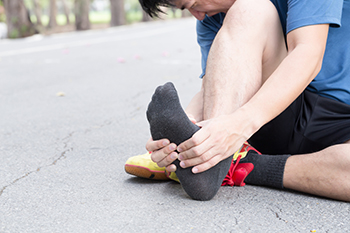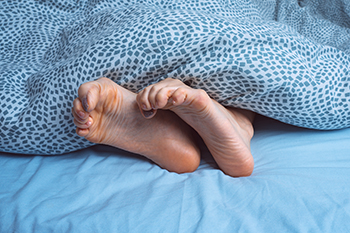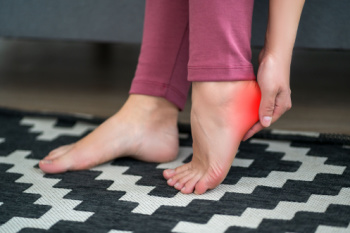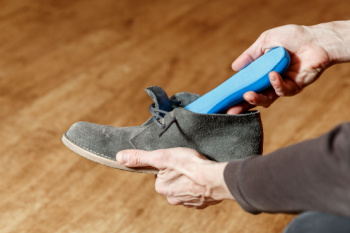Garner (919) 661-4150
Garner (919) 661-4150
 Plantar fasciitis is a condition that results in heel pain. It happens when the plantar fascia, a thick band of tissue running across the bottom of your foot and connecting your heel bone to your toes, becomes inflamed. This inflammation can cause sharp, stabbing pain, particularly noticeable with your first steps in the morning or after long periods of rest. Customized foot orthotics can reduce the heel pain associated with plantar fasciitis by providing targeted support and cushioning to the foot. These tailored inserts fit into your shoes to distribute pressure more evenly across the foot, reduce strain on the plantar fascia, and correct any abnormal walking patterns that could be contributing to the pain. Customized orthotics can significantly alleviate uncomfortable heel pain from plantar fasciitis and help prevent its recurrence, especially because it is a solution tailored to your specific foot problems. If you are experiencing heel pain from plantar fasciitis, it is suggested that you visit a podiatrist, who can determine if customized orthotics are the right course of treatment for you.
Plantar fasciitis is a condition that results in heel pain. It happens when the plantar fascia, a thick band of tissue running across the bottom of your foot and connecting your heel bone to your toes, becomes inflamed. This inflammation can cause sharp, stabbing pain, particularly noticeable with your first steps in the morning or after long periods of rest. Customized foot orthotics can reduce the heel pain associated with plantar fasciitis by providing targeted support and cushioning to the foot. These tailored inserts fit into your shoes to distribute pressure more evenly across the foot, reduce strain on the plantar fascia, and correct any abnormal walking patterns that could be contributing to the pain. Customized orthotics can significantly alleviate uncomfortable heel pain from plantar fasciitis and help prevent its recurrence, especially because it is a solution tailored to your specific foot problems. If you are experiencing heel pain from plantar fasciitis, it is suggested that you visit a podiatrist, who can determine if customized orthotics are the right course of treatment for you.
Many people suffer from bouts of heel pain. For more information, contact Chukwuma Ukata, DPM of Advanced Carolina Foot and Ankle Center. Our doctor can provide the care you need to keep you pain-free and on your feet.
Causes of Heel Pain
Heel pain is often associated with plantar fasciitis. The plantar fascia is a band of tissues that extends along the bottom of the foot. A rip or tear in this ligament can cause inflammation of the tissue.
Achilles tendonitis is another cause of heel pain. Inflammation of the Achilles tendon will cause pain from fractures and muscle tearing. Lack of flexibility is also another symptom.
Heel spurs are another cause of pain. When the tissues of the plantar fascia undergo a great deal of stress, it can lead to ligament separation from the heel bone, causing heel spurs.
Why Might Heel Pain Occur?
Treatments
Heel pain should be treated as soon as possible for immediate results. Keeping your feet in a stress-free environment will help. If you suffer from Achilles tendonitis or plantar fasciitis, applying ice will reduce the swelling. Stretching before an exercise like running will help the muscles. Using all these tips will help make heel pain a condition of the past.
If you have any questions please contact our office located in Garner, NC . We offer the newest diagnostic and treatment technologies for all your foot and ankle needs.

Toe cramps are sudden and involuntary muscle contractions that can cause severe pain and immobility. Cramps in the toes, which occur when muscles contract and fail to relax, commonly occur at night. Toe cramps can be triggered by dehydration, electrolyte imbalance, tight footwear, and prolonged body positions, particularly in high-heat conditions. Underlying health issues like arteriosclerosis, which restricts blood flow to the extremities, can also contribute to toe cramps. Certain demographics, including athletes, older adults, and pregnant women, are more likely to experience recurring cramps due to muscle fatigue, age-related muscle loss, and hormonal changes. Toe cramps are generally treatable through certain lifestyle adjustments, increased hydration, and gentle stretching. However, if they continue or get worse, it is suggested that you schedule an appointment with a podiatrist. This foot doctor is medically trained to perform a detailed exam and health history to determine the underlying cause of this condition. A podiatrist then can offer the appropriate treatment solutions.
Toe pain can disrupt your daily activities. If you have any concerns, contact Chukwuma Ukata, DPM of Advanced Carolina Foot and Ankle Center. Our doctor can provide the care you need to keep you pain-free and on your feet.
What Causes Toe Pain?
Most severe toe pain is caused due to a sports injury, trauma from dropping something heavy on the toe, or bumping into something rigid. Other problems can develop over time for various reasons.
Toe pain can be caused by one or more ailments. The most common include:
When to See a Podiatrist
Diagnosis
In many cases the cause of toe pain is obvious, but in others, a podiatrist may want to use more advanced methods to determine the problem. These can range from simple visual inspections and sensation tests to X-rays and MRI scans. Prior medical history, family medical history, and any recent physical traumatic events will all be taken into consideration for a proper diagnosis.
Treatment
Treatments for toe pain and injuries vary and may include shoe inserts, padding, taping, medicines, injections, and in some cases, surgery. If you believe that you have broken a toe, please see a podiatrist as soon as possible.
If you have any questions please feel free to contact our office located in Garner, NC . We offer the newest diagnostic tools and technology to treat your foot and ankle needs.

A heel spur is a sharp, bony outgrowth often resulting from irritation of the plantar fascia, known as plantar fasciitis. Increased strain on the Achilles tendon can exacerbate this growth, either beneath the foot, a lower heel spur, or at the back of the heel, a rear heel spur. While visible on X-rays, heel spurs may not be apparent externally. Symptoms include stabbing heel pain, especially when weight is applied, particularly in the morning. Inflammation can cause swelling and warmth, sometimes accompanied by a visible protrusion. Though occasionally asymptomatic, heel spurs can significantly impact mobility and comfort. Common causes involve prolonged or uneven pressure during walking or running, leading to inflammation of the plantar fascia or Achilles tendon. Addressing these issues involves reducing strain, managing inflammation, and enhancing foot muscle strength. Appropriate footwear, weight management, and foot muscle activation are important preventive measures. If you are suffering from a painful heel spur, it is suggested that you make an appointment with a podiatrist who can make a proper diagnosis and offer you treatment options fitting your situation.
Heel spurs can be incredibly painful and sometimes may make you unable to participate in physical activities. To get medical care for your heel spurs, contact Chukwuma Ukata, DPM from Advanced Carolina Foot and Ankle Center. Our doctor will do everything possible to treat your condition.
Heels Spurs
Heel spurs are formed by calcium deposits on the back of the foot where the heel is. This can also be caused by small fragments of bone breaking off one section of the foot, attaching onto the back of the foot. Heel spurs can also be bone growth on the back of the foot and may grow in the direction of the arch of the foot.
Older individuals usually suffer from heel spurs and pain sometimes intensifies with age. One of the main condition's spurs are related to is plantar fasciitis.
Pain
The pain associated with spurs is often because of weight placed on the feet. When someone is walking, their entire weight is concentrated on the feet. Bone spurs then have the tendency to affect other bones and tissues around the foot. As the pain continues, the feet will become tender and sensitive over time.
Treatments
There are many ways to treat heel spurs. If one is suffering from heel spurs in conjunction with pain, there are several methods for healing. Medication, surgery, and herbal care are some options.
If you have any questions feel free to contact our office located in Garner, NC . We offer the latest in diagnostic and treatment technology to meet your needs.

Many older adults have foot and ankle problems that affect their daily activities, balance, and quality of life. These issues, like dry skin, reduced joint movement, and weak feet, often lead to foot deformities, pain, and difficulty walking. Ankle-foot orthoses, or AFOs, are commonly used to help with these problems by supporting joints and improving stability. Custom-made orthotics align the foot, reduce pain, and encourage more physical activity. They can help improve balance and possibly reduce the fear of falling as well. If you are an older adult and are experiencing foot problems, or have a desire to prevent age-related foot conditions from interfering with life, it is suggested that you schedule an appointment with a podiatrist to discuss if custom-made orthotics are the right choice for you. Custom-made orthotics can lead to better balance and more activity, especially for those who wear them consistently.
If you are having discomfort in your feet and would like to try orthotics, contact Chukwuma Ukata, DPM from Advanced Carolina Foot and Ankle Center. Our doctor can provide the care you need to keep you pain-free and on your feet.
What Are Orthotics?
Orthotics are inserts you can place into your shoes to help with a variety of foot problems such as flat feet or foot pain. Orthotics provide relief and comfort for minor foot and heel pain but can’t correct serious biomechanical problems in your feet.
Over-the-Counter Inserts
Orthotics come in a wide variety of over-the-counter inserts that are used to treat foot pain, heel pain, and minor problems. For example, arch supports can be inserted into your shoes to help correct overarched or flat feet, while gel insoles are often used because they provide comfort and relief from foot and heel pain by alleviating pressure.
Prescription Orthotics
If over-the-counter inserts don’t work for you or if you have a more severe foot concern, it is possible to have your podiatrist prescribe custom orthotics. These high-quality inserts are designed to treat problems such as abnormal motion, plantar fasciitis, and severe forms of heel pain. They can even be used to help patients suffering from diabetes by treating foot ulcers and painful calluses and are usually molded to your feet individually, which allows them to provide full support and comfort.
If you are experiencing minor to severe foot or heel pain, it’s recommended to speak with your podiatrist about the possibilities of using orthotics. A podiatrist can determine which type of orthotic is right for you and allow you to take the first steps towards being pain-free.
If you have any questions please contact our office located in Garner, NC . We offer the newest diagnostic and treatment technologies for all your foot and ankle needs.